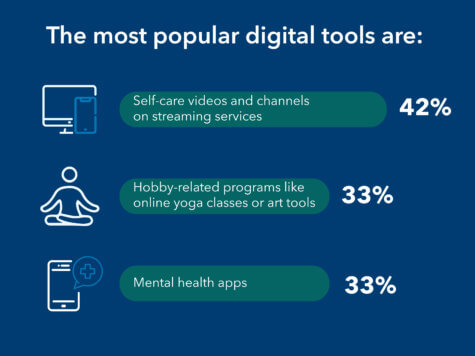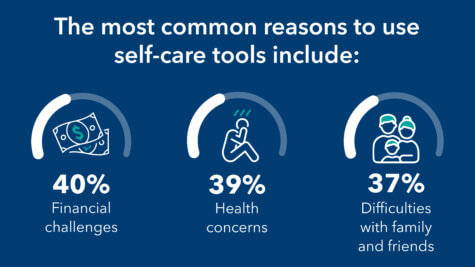
NEW YORK — More than three-fourths of Americans have increased their use of digital tools that support their mental health during the pandemic. In a recent survey of 2,003 adult respondents, 76 percent say the stress of the public health crisis has inspired them to practice self-care more than they had before. Meditation, in particular, is proving to be quite beneficial to people who practice it regularly.
Among the tools respondents find most effective for improving their mental well-being are self-care videos and channels on streaming services (42%), hobby-related programs like online yoga classes or art tools (33%), and use of mental health apps (33%).
Conducted by OnePoll on behalf of Kaiser Permanente, the survey also finds that 48 percent who practice mental health self-care are seeking ways to positively cope with emotional distress related to anxiety, depression, and anger.
Meditation is helping people manage stress
 Forty percent named financial challenges as the concern they wanted to address. Some 39 percent cited health concerns and 37 percent noted difficulties with family and friends as a source of worry. Other concerns identified by respondents include loneliness and social challenges (35%), problems with intimate relationships (33%), concerns about the COVID-19 pandemic (33%), and other current events (29%), and worries about work and school (26%).
Forty percent named financial challenges as the concern they wanted to address. Some 39 percent cited health concerns and 37 percent noted difficulties with family and friends as a source of worry. Other concerns identified by respondents include loneliness and social challenges (35%), problems with intimate relationships (33%), concerns about the COVID-19 pandemic (33%), and other current events (29%), and worries about work and school (26%).
To help manage their mental load, 57 percent meditate regularly as part of their self-care routine, for an average of two hours a week. That works out to about 18 minutes a day — or 109 hours a year.
Respondents cited numerous benefits from these meditation sessions, including improved focus (60%), improved sleep (57%), better emotional control (51%), and better sex (42%). About half the poll say they’ve looked for ways to manage substance abuse issues within the past two years. The self-care tools they’ve found most beneficial for achieving this include meditation apps (52%), in-person therapy (45%), and virtual therapy (43%).
“The events of the past several years, including the COVID-19 pandemic, have clearly taken a toll on our emotional well-being,” says Cosette Taillac, LCSW, vice president for Mental Health and Wellness at Kaiser Permanente, in a statement. “Digital self-care tools for mindfulness, meditation and cognitive behavioral therapy can help boost resilience and offer useful and accessible self-help tools for people experiencing emotional distress.”
Is there a ‘wrong way’ to address mental health?
 Although more than half the poll expressed an interest in improving their mental health with new digital tools, some are still hesitant to do so. Forty-two percent think these tools seem complicated, while 41 percent worry about their privacy online or don’t think digital tools will be as effective as real-life tools. A quarter of respondents are afraid of “doing it wrong.”
Although more than half the poll expressed an interest in improving their mental health with new digital tools, some are still hesitant to do so. Forty-two percent think these tools seem complicated, while 41 percent worry about their privacy online or don’t think digital tools will be as effective as real-life tools. A quarter of respondents are afraid of “doing it wrong.”
“Digital self-care tools are not meant to take the place of care from a skilled mental health clinician,” Taillac says. “But evidence-based apps can complement that care and support overall emotional well-being. That’s especially true when the app has been vetted and recommended by a trusted health care provider, making it more likely that patients will feel comfortable using the resource.”
